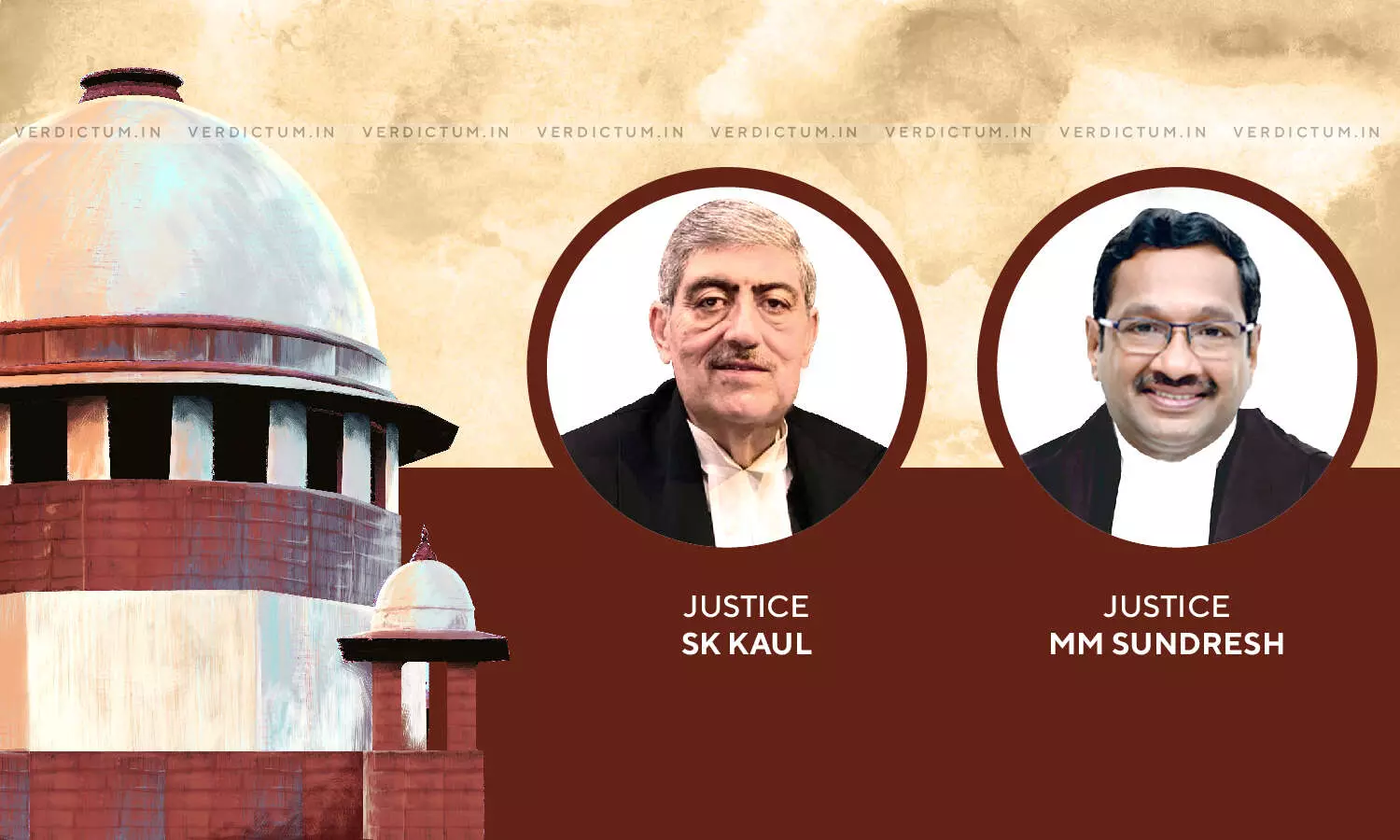
Specific Performance Cannot Be Enforced Against A Bonafide Purchaser In A Transaction Prior To Institution Of Suit - SC Reiterates
 |
|A two-judge Bench of Justice Sanjay Kishan Kaul and Justice M.M. Sundresh have held that specific performance of a contract cannot be enforced against bonafide purchasers or their transferees who are paying money in good faith and without notice of the original contract.
The Court also noted that a substantial question of law had to be framed by the High Court in order to exercise its powers and jurisdiction under Section 100 of the Code of Civil Procedure, 1908.
In the present case, a suit of specific performance of the agreement transferring title was filed before the Principal Sub-Court at Chengalpattu by the Respondents which was dismissed and subsequently the appeal before the District Judge at Chengalpattu was also dismissed. However, the second appeal before the Madras High Court was allowed whereby the specific performance of the agreement for 50 acres of land was decreed and later executed.
The dispute arose out of a second suit filed by the Respondent claiming a declaration of title and delivery with respect to 0.08 cents of land which were allegedly trespassed over by the Appellant. This suit was dismissed by both the Trial Court and the Principal Sub-Court at Chengalpet. However, the second appeal before the Madras High Court was allowed in favor of the Respondents. The impugned judgment of the Madras High Court had been challenged by the Appellant Trust before the Supreme Court.
Counsel Yogesh Kanna appeared for the Appellant Trust while Counsel KK Mani and Counsel V Ramasubramanian appeared for the Respondents before the Apex Court.
It was contended by the Appellant before the Supreme Court that the Madras High Court did not frame a substantial question of law which was essential for the Court to exercise its jurisdiction under Section 100 of the Code of Civil Procedure, 1908. It was stated that the High Court had undertaken a fact-finding exercise and re-appreciated evidence which was outside its jurisdiction.
Additionally, it was argued that an adverse inference and presumption must be taken against the Respondent who had willing not deposed and not offered themselves to be cross-examined. Moreover, it was claimed that the failure to implead a necessary party would render the suit and decree of specific performance to a nullity as well as could alternatively, be vitiated by fraud. The Appellant lastly urged the correct appreciation of Section 114 of the Evidence Act, which allows the Court to presume the existence of certain facts. Based on these contentions, the Appellant prayed for the dismissal of the suit of specific performance.
While the Respondent claimed that despite the suit was for a small extent of land, it affected the enjoyment of their possession over the larger extent of land. Moreover, it was contended that the Trial Court and the Lower Court had overlooked vital evidence and thus, the High Court had validly exercised its jurisdiction under Section 100 of the Code of Civil Procedure, 1908. Since no issue had been framed, it was stated that there existed no need of impleading the parties to the suit.
The Apex Court found that there were more than one infirmities that were required to be dealt with and for this reason, the impugned judgment of the High Court could not be upheld.
i) Question of law ought to have been framed U/s 100 CPC
The Supreme Court held that a question of law ought to have been framed by the Madras High Court under Section 100 of the Code of Civil Procedure, 1908 before adjudicating the case. Referring to the case of Surat Singh v. Siri Bhagwan, it was held that framing a substantial question of law was mandatory and should have been complied with before deciding the case even if it was not framed at the stage of admission.
"The crucial aspect is the decree obtained for specific performance by the Respondent and the manner of obtaining the decree. The Respondent was fully aware of the prior registered transaction in respect of the same property originally in favour of Niraja Devi. This is as per the deposition of her manager. In such a scenario it is not possible for us to accept that a decree could have been obtained behind the back of a bona fide purchaser, more so when the transaction had taken place prior to the institution of the suit for specific performance (Vidyadhar v. Manikrao and Man Kaur v. Hartar Singh Sangha)," the Bench opined.
ii) Respondent did not step into the witness box to depose the facts
In this context, the Court held that since the Respondent did not even step into the witness box to depose the facts, it was his manager who stepped in, and what the latter deposed ran contrary to the interest of the Respondent. Further, the Bench observed -
"Thus, the endeavour was to obtain a decree at the back of the real owners and that is the reason, at least, in the execution proceedings that the original vendor did not even come forward and the sale deed had to be executed through the process of the Court."
Additionally, the Court held, "The case of Niraja Devi and the subsequent purchasers including the Appellant would fall within the exception set out in Section 19(b) of the Specific Relief Act, being transferees who had paid money in good faith and without notice of the original contract."
The Court also held that "In such a scenario it is not possible for us to accept that a decree could have been obtained behind the back of a bona fide purchaser, more so when the transaction had taken place prior to the institution of the suit for specific performance".
Thus, the Supreme Court set aside the impugned judgment of the Madras High Court and dismissed the suit of the Respondent, and allowed the appeal.